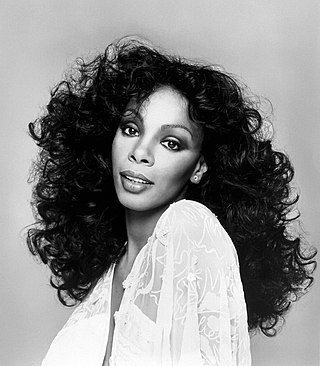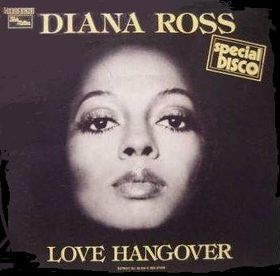
Gloria Gaynor is an American singer, best known for the disco era hits "I Will Survive" (1978), "Let Me Know " (1979), "I Am What I Am" (1983), and her version of "Never Can Say Goodbye" (1974).

Donna Adrian Gaines, known professionally as Donna Summer, was an American singer and songwriter. She gained prominence during the disco era of the 1970s and became known as the "Queen of Disco", while her music gained a global following.

Vicki Sue Robinson was an American singer, closely associated with the disco era of late 1970s pop music; she is most famous for her 1976 hit, "Turn the Beat Around".
Tina Charles is an English singer who achieved success as a disco artist in the mid to late 1970s. Her most successful single was the UK no. 1 hit "I Love to Love " in 1976.

"Love Hangover" is a song by the Motown singer Diana Ross, recorded in 1975 and released as a single on March 16, 1976. It rose to number one on the Billboard Hot 100 and Hot-Selling Soul Singles. It also hit number one on the Record World disco charts.

"Never Can Say Goodbye" is a song written by Clifton Davis and originally recorded by the Jackson 5. The song was originally written and intended for the Supremes; however, Motown decided it would be better for the Jackson 5. It was the first single released from the group's 1971 album Maybe Tomorrow, and was one of the group's most successful records. It has been covered numerous times, most notably in 1974 by Gloria Gaynor and in 1987 by British pop group the Communards.

"Walking on Thin Ice" is a song by Yoko Ono, released in 1981. She and John Lennon concluded the recording of the song on December 8, 1980. It was upon their return from the recording studio to The Dakota that Lennon was murdered by Mark David Chapman. Lennon was clutching a tape of a final mix of the song before it was mastered when he was shot. The song was both a critical and commercial success for Ono.
Dance Club Songs was a chart published weekly between 1976 and 2020 by Billboard magazine. It used club disc jockeys set lists to determine the most popular songs being played in nightclubs across the United States.
Michael Zager is an American record producer, composer, and arranger of original music for commercials, albums, network television, and theme music for films. He teaches music at Florida Atlantic University. Zager was a member of jazz rock band Ten Wheel Drive from 1968 to 1973.

Pattie Brooks is an American singer most frequently associated with the disco era. She was born in Fort Riley, Kansas to a military family. Her first break came in 1968 when she auditioned for the chorus on The Smothers Brothers Comedy Hour. In the next decade she became a sought-after backing singer, appearing on the Bobby Darin Show and touring with, among others Helen Reddy. She sang backing vocals on Donna Summer's album I Remember Yesterday.

Evelyn "Champagne" King is an American singer, songwriter, and record producer. She is best known for her hit disco single "Shame", which was released in 1977 during the height of disco's popularity. King had other hits from the early through the mid–1980s including; "I'm in Love" (1981), "Love Come Down" (1982) and "Your Personal Touch" (1985).
Claudja Barry is a Jamaican-born Canadian singer. Her successful songs were "Down and Counting", "Boogie Woogie Dancin' Shoes", "Dancing Fever", and others. As an actress, she is known for appearing in the European versions of stage musicals AC/DC and Catch My Soul.
Domenico Monardo, known as Meco, was an American record producer and musician, as well as the name of his band or production team. Meco is best known for his 1977 space disco version of the Star Wars theme from his album Star Wars and Other Galactic Funk; both the single and album were certified platinum in the US.

"I'm Coming Out" is a song recorded by American singer Diana Ross. It was written and produced by Chic members Bernard Edwards and Nile Rodgers, and released on August 22, 1980, as the second single from Ross’s self-titled tenth album, Diana (1980).

Heartbreaker is the twentieth solo studio album by American singer-songwriter Dolly Parton. It was released on July 17, 1978, by RCA Victor. The album was produced by Gary Klein and Parton with Charles Koppelman serving as executive producer, and was an even more direct aim at the pop charts, with several of its songs verging on disco. The album topped the Billboard Top Country Albums chart for nine consecutive weeks and peaked at number 27 on the Billboard 200. The album produced two number one hits on the Billboard Hot Country Songs chart, "Heartbreaker" and "I Really Got the Feeling", while "Baby I'm Burnin'" peaked at number 25 on the Billboard Hot 100. The album has been certified Gold in the United States and Canada.

"Baby I'm Burnin'" is a song by American singer-songwriter Dolly Parton. It was written by Parton who also produced the track with Gary Klein and Charles Koppelman who served as executive producer. The song was first released on Parton's twentieth solo studio album Heartbreaker in July 1978. It was released as a double A-side single with "I Really Got the Feeling" on November 6, 1978 by RCA Victor. "Baby I'm Burnin'" was aimed at pop radio, while "I Really Got the Feeling" was aimed at country radio. In addition to the standard 7-inch single, an extended 12-inch single titled Dance with Dolly was released, which included an extended dance remix of "Baby I'm Burnin'" backed with an extended dance remix of "I Wanna Fall in Love". Parton frequently performs "Baby I'm Burnin'" in concert, often using it as her opening number. She also used the song as the theme to her 1987–1988 television series Dolly.
Midland International Records was a US record label founded in 1974 by Eddie O'Loughlin and Bob Reno.
Sharon Brown is an American singer-songwriter and musician who was born in Harlem, New York City. She is the niece of songwriter Phil Medley, who co-wrote the song "Twist and Shout". She is also the daughter of drummer William Brown, who played with musicians such as The Isley Brothers and Cannonball Adderley.
"Doctor's Orders" is a song written by Roger Cook, Roger Greenaway and Geoff Stephens which, in 1974, was a hit in the UK for Sunny of Sue and Sunny; in the US the song was a hit for Carol Douglas.

"Let's All Chant" is a song written by American record producer and composer Michael Zager and Alvin Fields, and performed by the Michael Zager Band. It was based on an idea originally suggested by former A&M Records head of A&R Jerry Love after he visited clubs in New York and saw people endlessly chanting "Ooh-ah, Ooh-ah". Although Zager was first embarrassed when Love asked him to write a song using these chants, he accepted the proposal and later co-wrote "Let's All Chant" with Fields.












